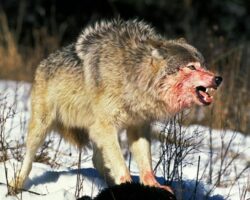According to federal wildlife officials, Colorado ranchers can kill wolves that are attacking livestock

Farmers and untamed life authorities will be permitted to kill wolves that are going after domesticated animals as the animals are once again introduced along the Western Slant, the U.S. Fish and Natural life Administration said Friday.
The choice came as the organization proclaimed dim wolves an exploratory populace under 10(j) rule of the Imperiled Species Act, considering adaptable administration methodologies as Colorado starts its renewed introduction by Dec. 31.
Administrators endorsed regulation this year that would have suspended wolf renewed introduction in Colorado until the 10(j) assignment was met, yet Gov. Jared Polis rejected the work, saying it was “superfluous and subverts the citizens’ purpose and the difficult work” throughout the course of recent years by Colorado Parks and Untamed life authorities and different partners.
The state’s arrangement permits farmers whose domesticated animals are killed by wolves to be repaid up to $15,000 per animal. It frames numerous non-deadly mediations to deter wolves from killing animals, yet permits the killing of wolves trapped in the demonstration of going after animals or working canines. Killing wolves that are killing domesticated animals would disregard the Jeopardized Species Act without the 10(j) rule.
The choice was declared three weeks early, Colorado Parks and Untamed life chief Jeff Davis said.
“Public Natural Strategy Act work normally requires a few years and it was achieved in barely eighteen months,” Davis said in a news discharge Friday. ” The leadership of CPW is extremely appreciative of the United States Fish and Wildlife Service’s demonstrated dedication and partnership.
Colorado electors in 2020 barely supported the exceptionally argumentative statewide voting form drive guiding Colorado Parks and Untamed life to reestablish wolves in the state.
In a statement released on Friday, the non-profit conservation organization Center for Biological Diversity stated that requiring livestock owners to use nonlethal preventive methods prior to killing wolves “incentivizes poor husbandry and opens the door to chronic conflicts and associated killings of wolves.” Preventive measures could incorporate eliminating the cadavers of animals that weren’t killed by wolves before wolves can begin to search.
Senior conservation advocate Michael Robinson stated, “The state wolf plan and this new federal authorization will probably need to be revised soon to truly protect both wolves and livestock by mandating non-lethal prevention.”
The federal wildlife service has confirmed that gray wolves will begin to be released along the Western Slope this year, stating that Colorado’s plan to reintroduce wolves is on track.
The delivery in December will be the principal stage, and assuming that all works out as expected, 30 to 50 dim wolves will be presented west of the Mainland Gap throughout the span of three to five years.
Untamed life authorities desire to utilize dark wolves caught from various packs in the Northern Rockies or different locales in Oregon or Washington, as per Colorado Parks and Natural life wolf reclamation and the executives plan. The states are hesitant to help however CPW stays certain wolves will be accessible to be delivered in Colorado before the year’s over.
Idaho declined to give Colorado any of its wolves and untamed life authorities in Washington are as yet taking into account whether they will help, Colorado Parks and Natural life representative Joseph Livingston said Friday. Colorado has not agreed with Oregon or some other state.
CPW additionally contacted the Nez Perce Clan in north-focal Idaho, Livingston said.
The state has proposed wintertime discharges in two regions on the Western Slant: between Glenwood Springs and Vail on the Interstate 70 corridor and between Monarch Pass and Montrose on the US 50 corridor. The principal discharges are made arrangements for state or confidential land around the I-70 hallway.
After more than two years of planning and hundreds of hours of meetings across the state, Colorado’s plan to restore gray wolves to the state was finalized in May. The commissioners of Colorado Parks and Wildlife made the decision to do so unanimously. In developing its Environmental Impact Statement, the U.S. Fish and Wildlife Service stated that it reviewed more than 20,000 comments, establishing Colorado’s wolves as a non-essential experimental population.


